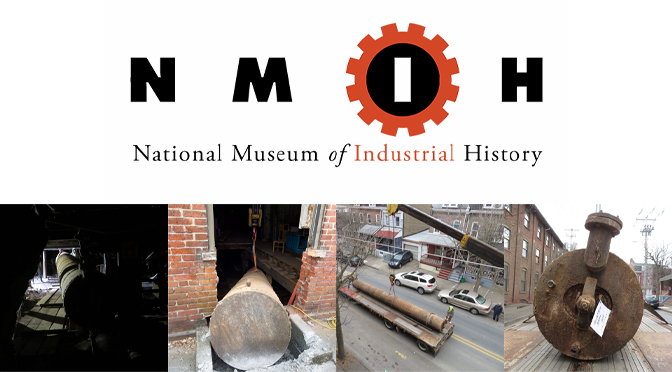|
|
Images provided by: National Museum of Industrial History/Lehigh University
Lehigh University’s Office of Real Estate Services works with Front Street Allentown developer, Manhattan Building Company, to salvage a boiler which once provided steam for the famous President Pumping Engine
BETHLEHEM, PA – 122 years ago, Gottlieb Buehler acquired a steam boiler from the shuttered Friedensville, Lehigh County, zinc mines. The boiler, essentially a giant enclosed tube in which water was boiled into steam, was a perfect choice to serve as a water tank for Buehler’s brand-new furniture factory on Front Street in Allentown, Pennsylvania. The massive 30-foot-long tank was placed in the middle of the factory building basement during its construction with no obvious way to remove, move, or replace. Built in Philadelphia about 1870, the rivetted boiler was one of 22 which were required to operate the famous President Pumping Engine. This engine was scrapped in 1900 following the mine’s closure and the boiler was available for this new purpose. Once in the factory basement, the tank was in water service until recently as the building is now scheduled for demolition as part of the Manhattan Building Company’s Riverfront Lofts development.
Thanks to the support and donation of the tank by the Manhattan Building Company, the recovery of the tank by Lehigh University and the support of community advocates and the National Museum of Industrial History, the tank was successfully turned 90 degrees in the basement and lifted out of the building through a hole cut through the ground floor using specialized lifting and moving equipment. Lehigh University’s contractor performing the work, Bean Inc. Contractors, then carefully placed the tank onto a flatbed trailer operated by R.E. Daumer Trucking and transported the tank to an inside storage location at the former New Jersey Zinc mine location on Camp Meeting Road in Upper Saucon Township. The property is owned by Lehigh and was acquired as a gift from the Donald B. and Dorothy L. Stabler Foundation in 2012.
The plan is to eventually have the tank restored and on display in front of the engine house where it was first located and which once held The President Pumping Engine. The President Pumping Engine location at the Ueberroth mine site in Friedensville, Upper Saucon Township, was approved for a PA historic roadside marker to be placed at this property on Old Bethlehem Pike just last month. The property, which is part of Stabler Pathways, is unimproved and restricted, but Lehigh is developing options to stabilize and repair the engine house and allow public access. Lehigh has obtained grant support through matching funds for structural evaluations, construction repair documents and conceptual designs from both the Louis J. Appell, Jr. Preservation Fund for Central Pennsylvania of the National Trust for Historic Preservation and the Pennsylvania Historical and Museum Commission’s Keystone Historic Preservation Grant program funded by the Commonwealth of Pennsylvania. In addition to the boiler, Lehigh was also able to recover wood beams from the floor supports which will be used to replace failing lintels in the surviving engine house ruins.
“This is a great day for all the people who have worked hard on behalf of the recognition and preservation of the remaining assets of The President Pumping Engine. As the only metal artifact remaining of this famous engine, recovery of this historic boiler is a major milestone,“ said Kara Mohsinger, President and CEO, the National Museum of Industrial History (NMIH).
“We applaud the foresight of the Manhattan Building Company and Lehigh University and their generous support in saving this unique remanent of our industrial history and invite visitors to come and see our new display at the museum on The President, which includes a working scale model of the engine.” Mike Piersa, NMIH Historian, added, “An intact stationary steam boiler from the 1870s is an extremely rare find. Most boilers of that era were melted down, having been replaced due to obsolescence, corrosion, or scrap drives during the 20th century World Wars. Due to its obscure location and continued use as an integral part of the building’s water supply infrastructure, this boiler turned tank beat the odds and now we can celebrate its survival, and eventual return to its first home. The boiler was made in one of the preeminent iron works along the Philadelphia waterfront which led the city to be known as the Workshop of the World.”
Additional Background
For more information on the historical markers approved by the PHMC this year:
https://www.media.pa.gov/
For more information on the Friedensville zinc mines and The President Pumping Engine:
https://www.
For more information about the Stabler Foundation gift:
https://www2.lehigh.edu/news/
About the National Museum of Industrial History
A Smithsonian Institution Affiliate, the National Museum of Industrial History is dedicated to preserving America’s rich industrial heritage. Housed in a 18,000-square-foot, 100-year-old former Bethlehem Steel facility on the largest private brownfield in America, the Museum is home to exciting exhibits, engaging programs, and amazing history. Learn more at nmih.org.
About Lehigh University
Located in Pennsylvania’s beautiful Lehigh Valley, Lehigh is one of the nation’s most distinguished private research universities. Through academic rigor, an entrepreneurial mindset and collaborative opportunities we challenge our students to become the leaders of the future. Learn more at lehigh.edu.
About Lehigh University’s Stabler Pathways
A Lehigh University development initiative located in the heart of Pennsylvania’s thriving Lehigh Valley region. As a connected community, Stabler Pathways offers a place where business, social, and academic paths intersect in interesting ways. Learn more at stablerpathways.com.
Information provided to TVL by:
Megan Pildis
VP of Business Development
National Museum of Industrial History












